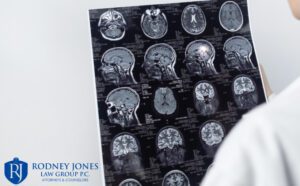Car accidents can be some of the most terrifying experiences one can endure. Rodney Jones Law Group, based in Houston, Texas, specializes in assisting individuals involved in these traumatic events. To better understand the physical and emotional toll of a car crash, let’s review what happens to your body during and after such an event. If you or a loved one has been involved in an auto accident, we can help you navigate the aftermath.
Initial Impact and Immediate Effects
During a car crash, the sudden stop or impact forces your body to experience extreme acceleration or deceleration. This immense force can lead to significant injuries, regardless of whether you’ve been in a minor fender bender or a more severe crash.
Here’s what typically happens immediately after the impact:
– Your body stays in motion even if the car stops abruptly, leading to potential injuries.
– Safety features like airbags and seatbelts engage to try to protect you, which can sometimes cause injuries themselves.
Immediate Effects of a Car Crash:
1. Shock and adrenaline rush
2. Initial injury assessment by you or first responders
3. Activation of emergency services
Read more about what to do after a car accident in Texas here.
Physical Injuries Common in Car Accidents
It’s important to be aware of the various types of injuries that can occur during a car crash. These injuries can range from minor to catastrophic, necessitating different levels of medical care and legal intervention.
Head and Brain Injuries
One of the most serious consequences of a car crash is a head injury. These can range from simple concussions to severe traumatic brain injuries (TBI).
- Concussions and TBIs: Symptoms can include headaches, loss of consciousness, confusion, and more severe long-term cognitive effects.
- Skull Fractures: Direct impact with the car’s interior or flying objects can cause fractures, necessitating immediate medical attention.
If you experience a traumatic brain injury in an accident, it might lead to catastrophic personal injuries. Find out more about your rights here.
Neck and Spinal Injuries
Neck and spinal injuries are also extremely common in car accidents, often due to the whipping motion caused by impact.
- Whiplash: Soft tissue injuries in the neck that can lead to long-term pain and suffering.
- Spinal Cord Injuries: These can result in partial or total paralysis, requiring lifelong care and legal intervention for support and compensation.
Chest and Abdominal Injuries
The impact of a car crash can severely affect your chest and abdomen, especially due to seatbelt pressure and airbag deployment.
- Internal Bleeding: The force of the crash can cause internal injuries that may not be immediately apparent.
- Rib Fractures and Organ Damage: These injuries are serious and require immediate medical attention.
Limb Injuries
Injuries to arms and legs are common due to the confined space within a vehicle and the force of the impact.
- Fractures and Dislocations: Broken bones and joint injuries often occur from bracing or impact with interior parts of the car.
- Amputations: In severe cases, particularly in high-speed crashes, limb amputation may occur.
Learn more about dealing with car accidents and injuries here.
Emotional and Psychological Impact
Car accidents don’t just result in physical injuries. The emotional and psychological toll can be equally devastating.
Common Emotional Responses:
1. Post-Traumatic Stress Disorder (PTSD)
2. Anxiety and Depression
3. Emotional Distress and Trauma
Steps to Take After a Car Accident
Knowing what to do immediately following a car accident is crucial for your safety and legal standing.
Immediate Steps After a Car Accident:
1. Check for injuries and call emergency services.
2. Document the accident scene with photos and notes.
3. Exchange information with the other parties involved.
4. Contact your insurance company to report the incident.
For a complete guide on what to do after a car accident, visit our page here.
Legal Rights and Compensation
Your legal rights following a car accident can significantly impact the compensation you receive for your injuries.
- Medical Expenses: Coverage for hospital bills, ongoing treatment, and rehabilitation.
- Lost Wages: Compensation for the time you are unable to work due to injuries.
- Pain and Suffering: Often difficult to quantify but crucial for complete compensation.
- Property Damage: Costs associated with repairing or replacing your vehicle.
If you need legal assistance with an auto accident case, visit our auto accidents page for more information.
Frequently Asked Questions (FAQs)
What should I do immediately after a car accident?
First, check for injuries and seek medical attention if necessary. Then, document the scene, exchange information, and contact your insurance company. Learn more here.
How long do I have to file a claim after a car accident?
In Texas, the statute of limitations for filing a personal injury claim is generally two years from the date of the accident.
What types of compensation am I entitled to after a car accident?
You may be entitled to compensation for medical expenses, lost wages, pain and suffering, and property damage.
Can I handle the insurance claim on my own?
While it is possible, having a knowledgeable attorney can ensure you receive the highest possible compensation. To meet our team and see how we can assist you, click here.
What if the accident was partially my fault?
Texas follows a “modified comparative negligence” rule, meaning you can still recover damages if you’re less than 51% at fault, but your compensation will be reduced by your percentage of fault.
For more answers to common questions, visit our FAQ page here.
At Rodney Jones Law Group, we’re committed to helping you through each step of this challenging process. If you or a loved one has been involved in a car crash, don’t hesitate to reach out for the support and legal assistance you need.










